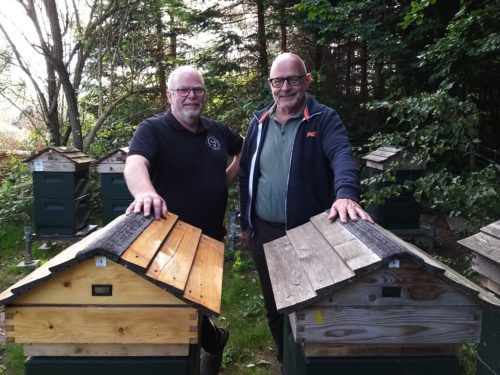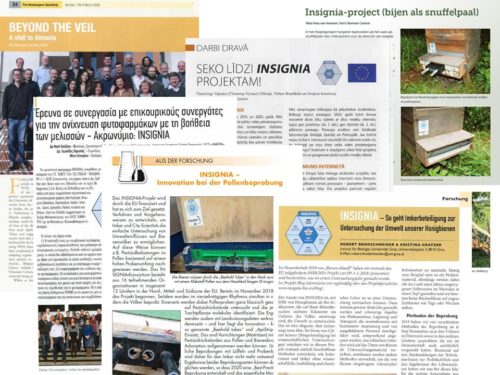This year, the TiBE – Trends in Biodiversity and Evolution Conference (https://cibio.up.pt/tibe/details/tibe2020) was fully dedicated to Metabarcoding and Metagenomics, which fitted like a glove in one of the INSIGNIA’s objectives: metabarcoding identification of botanical origin of pollen samples diligently collected by many Citizen Scientists from across Europe. Continue reading “INSIGINIA presenting on: TiBE – Trends in Biodiversity and Evolution Conference”
The emergence of the final apiculturist citizen science guidelines
 The INSIGNIA study has been running now for two years and we are entering the final stage. In these two years, we have gone through all stages of organizing an apiculturist citizen science study. We developed the passive sampler APIStrip, the efficient matrix to capture pesticides, and all the pitfalls that came on the way like the “not-to-be -misinterpretable” label, best practice for storage shipping, sampling schemes etc. Now it is time to bring all of this information together in the “Guideline for apiculturist citizen science for applying honeybee colonies for bio-monitoring of the environment – subject pesticides”. Given the Covid-19 restrictions, physical meetings to discuss all of the stages, best wording, most logical set-up, best flow-charts, and whatever it takes to write the best guidelines, would be great but are sadly impossible. Therefore we have started a scheme of virtual Teams-meetings with a strict agenda to go through all of these aspects. We started in December 2020 and will be finished in March 2021. There will be as many Teams-meetings as it takes to get the job done in time.
The INSIGNIA study has been running now for two years and we are entering the final stage. In these two years, we have gone through all stages of organizing an apiculturist citizen science study. We developed the passive sampler APIStrip, the efficient matrix to capture pesticides, and all the pitfalls that came on the way like the “not-to-be -misinterpretable” label, best practice for storage shipping, sampling schemes etc. Now it is time to bring all of this information together in the “Guideline for apiculturist citizen science for applying honeybee colonies for bio-monitoring of the environment – subject pesticides”. Given the Covid-19 restrictions, physical meetings to discuss all of the stages, best wording, most logical set-up, best flow-charts, and whatever it takes to write the best guidelines, would be great but are sadly impossible. Therefore we have started a scheme of virtual Teams-meetings with a strict agenda to go through all of these aspects. We started in December 2020 and will be finished in March 2021. There will be as many Teams-meetings as it takes to get the job done in time.
Jozef van der Steen
coordinator Insignia
Behind the Citizens Scientist – Martin Lesak

Looking on the danish map, Jylland kind of has a nose. On the tip of the nose Martin Lesak is living, since ever. Martin has Czech roots and he brings the beekeeping tradition from there. Martin is involved. Fascinated by the nature of the organism of the beehive. Continue reading “Behind the Citizens Scientist – Martin Lesak”
Behind the Citizens Scientist – Peter Sjøgren

We had the luck to visit all the danish citizens scientist during the week of collecting all the INSIGNIA samples for Denmark. Was a great opportunity to come behind the scene at the beekeepers. Having a talk on how the season went and hear the direct opinion about the project. Pros and cons!
Continue reading “Behind the Citizens Scientist – Peter Sjøgren”
Visiting Denmark

Corona and INSIGNIA
As told earlier, corona did influence the INSIGNIA project. Sjef van der Steen, the leader of the INSIGNIA Project had original the aim to visit as many of our Citizen Scientist in the 9 participating countries. Mission impossibly during corona time. Traveling is/was very difficult this summer. But we found a time-window for a visit in Denmark. Lot of car driving, more than 2.000 km in the small country of Denmark. But that is possibly. To have some exercise we did on our driving tour bring our bikes (read some had electric bikes, others without motor). Continue reading “Visiting Denmark”
The Danish hivescales system

In Denmark, actually in the Nordic Baltic countries, there is an electronic online hivescale system. We are using mainly 2 types of electronic hivescales. To far to get into this in this short note. The system is run by the Danish Beekeepers Association.
INSIGNIA 2019 – Austrian results published in popular article
Sample preparation for laboratory analysis!
In INSIGNIA we give much importance to proper sampling, proper labelling, proper and fast transportation, proper sample preparation and of cource efficient and cross checked laboratory analysis! See some examples!
Fani Hatjina- Greece





“Today (Friday) we received the last batch of pollen samples collected by citizen scientists from all over Europe in the first half of the season. Now, time to go to the lab and do the DNA extractions!”
Alice Pinto
More popular articles published…

With samples of pollen in alcohol, and ApiStrips from the first four sampling rounds of 2020 having arrived at the laboratories in Portugal, Spain and Greece for analysis, and with beekeepers in Austria, Belgium, Denmark, France, Greece, Ireland, Italy, Latvia and the UK preparing for the sixth sampling round this weekend, it is a busy time for the INSIGNIA project. The process of disseminating information about the project also continues, with articles about the progress of the project in popular beekeeping journals having recently been published in Austria, Germany, Greece, Latvia, the Netherlands and the UK. Further articles will be published soon in other participating countries…

